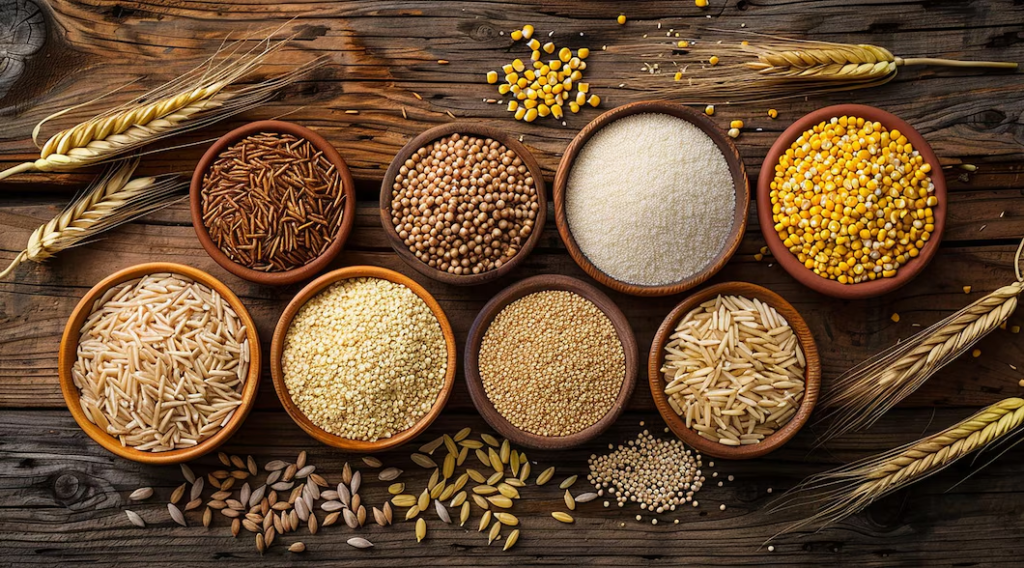In recent years, the interest in traditional ingredients has grown too much because of their numerous health benefits. Traditional Indian ingredients make the most of Indian dishes because the people believe in living by the tradition which gave way to many dishes that have regional, cultural, and traditional value. In this article, we will explore the benefits of using traditional Indian ingredients in your diet.
The Power of Indian Spices

Indian spices are the core of traditional Indian cuisine. The use of spices in Indian dishes is prominent not just because they add aroma and flavor but because they have healing properties. Every spice, from curcumin to ginger, to ajwain, to garam masala and many more, has its peculiar health benefits.
- Turmeric: Turmeric is not only popular in India but globally as well. Curcumin, the active compound of turmeric, gives it its healing properties. It is a powerful anti-inflammatory component that heals your body from inside out.
- Ginger: Ginger is another common ingredient found in traditional Indian dishes. It is known for its ability to soothe digestion and reduce nausea. It can also help to alleviate muscle soreness.
- Cumin: Cumin, a spice with high iron content and contains antioxidants. It aids in digestion by stimulating the production of pancreatic enzymes which help to break down food. Cumin is also attributed to improving blood sugar levels and controlling cholesterol.
- Fenugreek: Fenugreek is known for its benefits in regulating blood sugar levels and improving insulin sensitivity. It’s also rich in fiber, which supports digestion and helps maintain healthy cholesterol levels.
Whole Grains and Pulses

Whole grains are foods that make up the major part of the traditional Indian diet. Pulses like lentils, chickpeas, and millets are the whole grains that you will find in abundance in Indian cuisine. The reason why they are a prominent part of the traditional cuisine is that they offer a slow release of energy, support digestive health and keep your blood sugar level in control.
- Lentils (Dal): Dal or lentils are staple in India. You go to any corner and you will find dal to be a go-to comfort food for Indians. They are an excellent protein source which is also rich in dietary fiber, folate and magnesium.
- Chickpeas (Chana): Chickpeas can be used as a variant in Indian dishes. Their versatility to be cooked in dishes like curries, stews and snacks, chickpeas are high in protein and fiber.
- Millets: Millets, such as ragi, jowar, and bajra, are ancient grains packed with nutrients. They are gluten-free, making them suitable for those with celiac disease or gluten sensitivity. Rich in fiber, vitamins, and minerals, millets are excellent for digestive health and can help prevent diabetes by lowering blood sugar spikes. There was a time when its popularity had declined but now when people are getting back into health, they have realized the worth of millets and they have started to use them in regular household dishes.
Herbs That Nurture

Herbs are considered to be a blessing on the Indian subcontinent. They are used in cooking similarly like spices but in different manners. Again, they not just provide flavor and aroma to the dishes but also have medicinal properties.
- Holy Basil: Holy basil, widely known as tulsi is a significant plant in Ayurveda and has cultural significance in India. It is a prominent plant in Indian households because of its wide-range of health benefits including the ability to reduce stress and anxiety. Tulsi is known to have antioxidant properties that help the body from the damage caused by oxidative stress.
- Coriander: Coriander is both a spice and a herb used in Indian cooking. It aids in digestion, helps regulate blood sugar, and has been shown to lower cholesterol. The herb’s rich content of antioxidants can help combat inflammation.
- Mint: Known for its cooling properties, mint is often used to aid digestion, reduce bloating, and provide relief from headaches. Its antibacterial and anti-inflammatory properties make it a popular ingredient in Indian chutneys and teas.
Fermented Foods

Fermented foods have been a part of Indian traditional dishes for years. These fermented foods are beneficial for your gut health as they provide probiotics. Probiotics are essential for maintaining a healthy digestive system and immunity.
- Yogurt (Dahi): Dahi or yogurt, as it is known globally, is rich in probiotics which helps to balance gut bacteria. This supports digestion, boosts immunity and also helps with weight management. Dahi also has calcium and vitamin D in it which promotes bone health.
- Idli and Dosa Batter: Idli and dosa, the most famous South Indian dishes use fermented rice and lentil batter. This batter is rich in probiotics which is good for gut health. These two foods make one of the healthiest breakfasts in India. Fermented foods are a part of Indian dishes because the process of fermentation breaks down anti-nutrients and enhances nutrient absorption.
Healthy Fats

Fats are a part of our daily lives but those fats are not healthy for us. Indian traditional dishes use ingredients like ghee and coconut oil which are a source of healthy fat. People had this notion that these ingredients are not healthy. But healthy fats should be a part of your balanced meal and ghee has gained popularity in health circles as well.
- Ghee (Clarified Butter): Ghee is a nutrient-dense fat that has been used in Indian cooking for thousands of years. It contains butyrate, a short-chain fatty acid that supports gut health by reducing inflammation. Ghee is also rich in fat-soluble vitamins (A, D, E, and K), which are essential for maintaining healthy skin, vision, and immune function.
- Coconut Oil: Coconut oil is a prominent ingredient in South Indian cuisine. It contains medium-chain triglycerides (MCTs), which are known to support brain health and increase energy expenditure. Its antibacterial properties can help fight infections, and its lauric acid content is beneficial for heart health.
Ayurvedic Wisdom
Traditional Indian cooking is deeply rooted in Ayurveda. According to Ayurveda, food should be balanced with six key tastes: sweet, sour, salty, bitter, pungent, and astringent. By incorporating these flavors, you can create meals that not only nourish the body but also bring harmony to the mind and spirit.
For instance, sweet foods like grains and fruits nourish and calm the body, while pungent flavors from spices like black pepper and ginger stimulate digestion. Sour flavors from fermented foods and citrus fruits are said to cleanse the body and improve digestion. Including a balance of these tastes in your diet promotes overall well-being, energy balance, and mental clarity.
Gut Health and Digestion
Indian traditional dishes use ingredients that are good for your gut health and digestion. Gut health and digestion are important because it could be home to many diseases and illnesses. The ingredients that support gut health and digestion are:
- Ajwain (Carom Seeds): Ajwain is used to treat digestive problems. Sometimes people often consume ajwain to treat a mild stomach pain or irritation caused due to food. The other problems that ajwain can deal with are indigestion, bloating and gas. Ajwain is often used to treat digestive problems like indigestion, bloating, and gas. The thymol in carom seeds stimulates the secretion of gastric juices, aiding digestion. Ajwain is a common ingredient in dishes like paranthas and puris so they could be easily digested.
- Asafoetida (Hing): Hing is added in dishes to get a strong, pungent aroma. It is commonly used in lentil-based dishes. Adding hing in dishes helps to reduce bloating and gas.
- Fennel Seeds (Saunf): Fennel is often consumed after meals to help aid digestion. These seeds contain anethole which helps to relax muscles of the gastrointestinal system to reduce bloating and indigestion. Fennel seeds are also known to regulate appetite and are often served as a mouth freshener.
Traditional Indian Ingredients for Diabetics
Indian dishes also use ingredients that help to manage blood sugar levels. The traditional dishes are rich in fiber and use low glycemic index foods which are highly suited for people who have diabetes.
- Bitter Gourd (Karela): Bitter gourd, not a favorite of children, is a vegetable that is known for its ability to control blood sugar levels. It has compounds like charantine and polypeptide-p which mimics insulin and help regulate blood sugar levels. People often consume bitter gourd in the form of juice or as a sabzi to manage diabetes.
- Cinnamon (Dalchini): Cinnamon has been shown to improve insulin sensitivity and lower fasting blood sugar levels. Its bioactive compounds help regulate glucose metabolism, making it an excellent spice for diabetics to include in their diet.
- Methi (Fenugreek Seeds): As mentioned earlier, fenugreek is rich in soluble fiber, which slows down carbohydrate absorption and helps control blood sugar levels. Many diabetics in India soak fenugreek seeds overnight and consume them in the morning for their blood sugar-regulating properties.
Immunity-Boosting Indian Foods
In today’s world, building a strong immune system is a priority for many. Traditional Indian ingredients are packed with antioxidants, vitamins, and minerals that strengthen immunity.
- Amla (Indian Gooseberry): Amla is one of the richest natural sources of vitamin C. It strengthens the immune system, promotes healthy skin, and supports liver function. In Ayurveda, amla is often used in chyawanprash, an herbal jam made to boost immunity.
- Garlic: Garlic is known for its immune-boosting properties due to its high concentration of sulfur compounds, such as allicin, which help fight infections and strengthen the immune system. Raw or cooked garlic can be added to various Indian dishes, from dals to chutneys.
- Tulsi (Holy Basil): Tulsi is revered as an immunity booster in Ayurvedic tradition. It helps the body fight viral, bacterial, and fungal infections. Drinking tulsi tea or adding tulsi leaves to food provides a natural defense against colds and other infections.
Cardiovascular Benefits of Indian Ingredients
The rich variety of plant-based ingredients in traditional Indian cuisine offers a natural way to support cardiovascular health.
- Black Gram (Urad Dal): Rich in potassium and magnesium, black gram supports heart health by helping to control blood pressure. The fiber content also helps reduce LDL (bad) cholesterol, which is important for maintaining healthy arteries.
- Curry Leaves: These aromatic leaves, used in tempering, are known for their heart-protective properties. They are rich in antioxidants and help lower cholesterol, reducing the risk of heart disease. The vitamin A and C content also promotes overall cardiovascular function.
- Mustard Oil: While often overlooked, mustard oil is a common cooking medium in Indian households, especially in northern and eastern India. It’s rich in monounsaturated fats, omega-3, and omega-6 fatty acids, which are beneficial for heart health. It helps regulate cholesterol and is believed to reduce the risk of cardiovascular diseases.
Weight Management
Many traditional Indian ingredients support healthy weight management by promoting satiety and boosting metabolism.
- Sabja Seeds (Basil Seeds): Basil seeds are similar to chia seeds and have been used in Indian cuisine for centuries. They expand when soaked in water, creating a gel-like substance that helps you feel full and curbs hunger. They are often added to drinks like falooda and sherbets.
- Drumstick (Moringa): Known as a superfood, moringa leaves are packed with vitamins, minerals, and antioxidants. Moringa aids in digestion, supports fat metabolism, and helps regulate hormones linked to weight control. You can add moringa powder to smoothies or consume fresh drumstick leaves in soups and curries.
Practical Tips for Incorporating Traditional Indian Ingredients into Modern Diets
While traditional Indian ingredients are incredibly beneficial, incorporating them into a modern diet can be challenging due to busy schedules or unfamiliarity with cooking methods. Here are some simple tips:
- Start with Spices: Spices like turmeric, cumin, and coriander can easily be added to soups, smoothies, or even roasted vegetables. These spices not only enhance flavor but also provide health benefits with minimal effort.
- Batch Cooking Lentils and Grains: Prepare lentils or rice-based dishes like khichdi or dal in bulk. These dishes can be stored in the refrigerator and reheated, making them convenient and healthy meal options throughout the week.
- Fermented Foods for Breakfast: Incorporate fermented foods like idli or dosa into your morning routine. The batter can be made ahead of time and kept refrigerated, allowing for quick and nutritious breakfasts.
- Ghee and Coconut Oil for Cooking: Replace processed oils with ghee or coconut oil when sautéing or frying. These healthy fats are stable at high temperatures and can add a rich flavor to any dish.
Frequently Asked Questions
What are the benefits of Indian traditional foods?
Ans. Indian traditional foods use ingredients that are good for your digestive health. Also, the dishes focus on natural sources which makes it a complete and balanced meal rich with nutrients that your body needs.
Is traditional Indian diet healthy?
Ans. Yes, Indian traditional dishes are healthy because they use ingredients rich in nutrients that support your overall health.
Why are traditional foods important?
Ans. Traditional food is important because they have a long history of generations associated with it. The food uses ingredients that are rooted in a specific culture and there is a reason behind the use of every ingredient. Take Indian traditional food for instance. The traditional dishes use ingredients like herbs & spices, vegetables, lentils, fruit, seeds, and nuts that are nutrient-rich and provide essential nutrients to our bodies.




